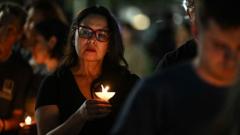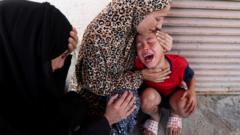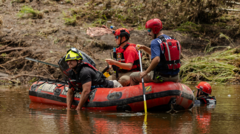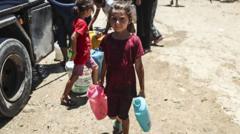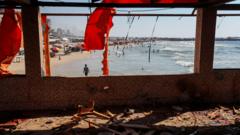The struggle for families in Gaza intensifies as they search through rubble for missing loved ones, dealing with grief and trauma in the aftermath of violence. The story highlights the harrowing experiences of those left behind and the tragic circumstances surrounding the search for the deceased.
The Heart-Wrenching Search for Missing Loved Ones in Gaza
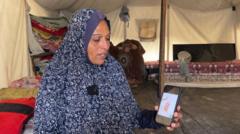
The Heart-Wrenching Search for Missing Loved Ones in Gaza
Families grapple with profound loss as search efforts uncover remains amidst the rubble in Rafah, following the devastating conflict.
The aftermath of the recent conflict in Gaza leaves families in a devastating search for their missing loved ones, amidst chaos and destruction. As the rubble is sifted through in Rafah, residents are confronted with the remnants of lives lost, represented by personal belongings, shards of clothing, and human remains.
Haitham al-Homs, director of Emergency and Ambulance Services in Rafah, reported that since Israeli forces withdrew, they have received numerous calls about bodies buried beneath collapsed structures. With an estimated 10,000 individuals unaccounted for, search teams often depend on information from relatives or the overwhelming stench of death that permeates the air.
Warning: This report contains sensitive content.
The challenges of identifying remains are compounded by the devastation left by military bombardments. Efforts to recover bodies are careful and poignant; often, the recovery amounts to mere fragments. Victims are placed in body bags inscribed with "majhoul," or "unidentified," a heavy reminder of the human cost of the conflict.
Osama Saleh, a resident of Rafah, shared his sorrow upon discovering a skeleton in his home, a stark reflection of the tragedy that surrounds him. The overwhelming realization of lost lives weighs heavily on the community, creating a pervasive sense of mourning. Families visit hospitals in search of their missing relatives, encountering yet more heartache.
In one poignant instance, Zaki searched for his missing nephew, Abdul Salam, amid a collection of bones and clothing. The confirmation of his nephew’s identity brought tears, showcasing the intimate connections severed by violence. Another family, faced with identifying multiple relatives, illustrates the broader trauma experienced by many in the region.
Among the lost is 13-year-old Aya al-Dabah, found shot by an Israeli sniper while seeking a bathroom at a school sheltering refugees. Her mother, Lina, recounts the tragic moment the family was forced to leave her behind. The aftermath of the conflict unraveled more horrors when they learned that Aya's grave had been disturbed, leading to more anguish and unanswered questions for Lina about what could have been done differently.
This narrative reveals the multifaceted layers of grief, trauma, and loss that have unfolded in Gaza, provoking discussions on accountability, human rights, and the enduring impact of conflict on communities. The stories of the missing and the grief of families beckon a fundamental inquiry into the human experience amidst warfare.



